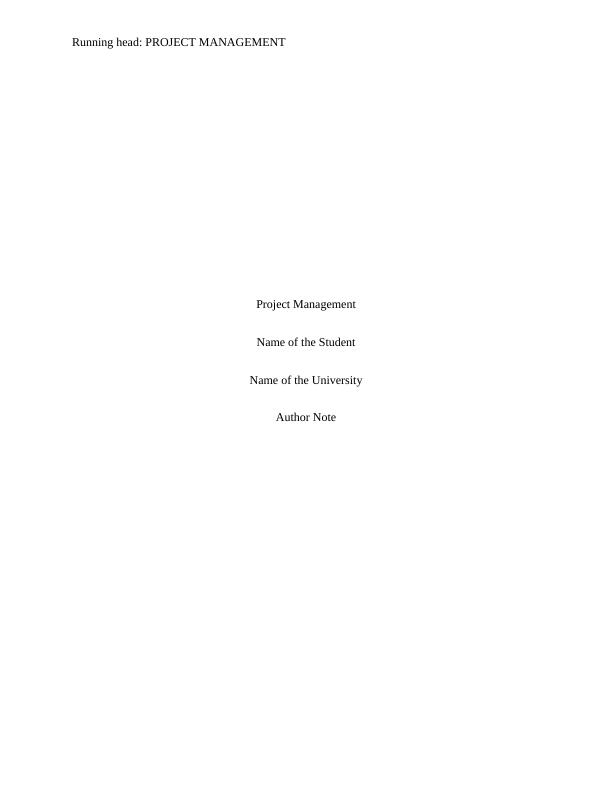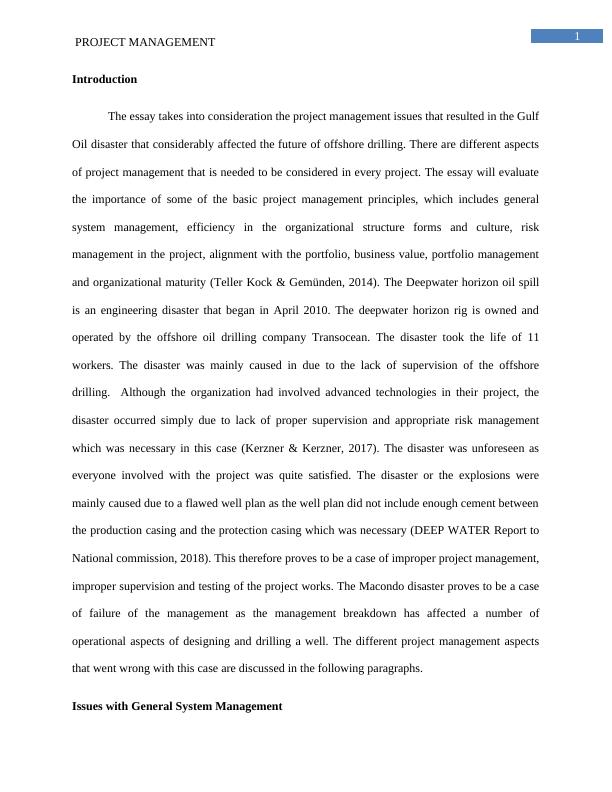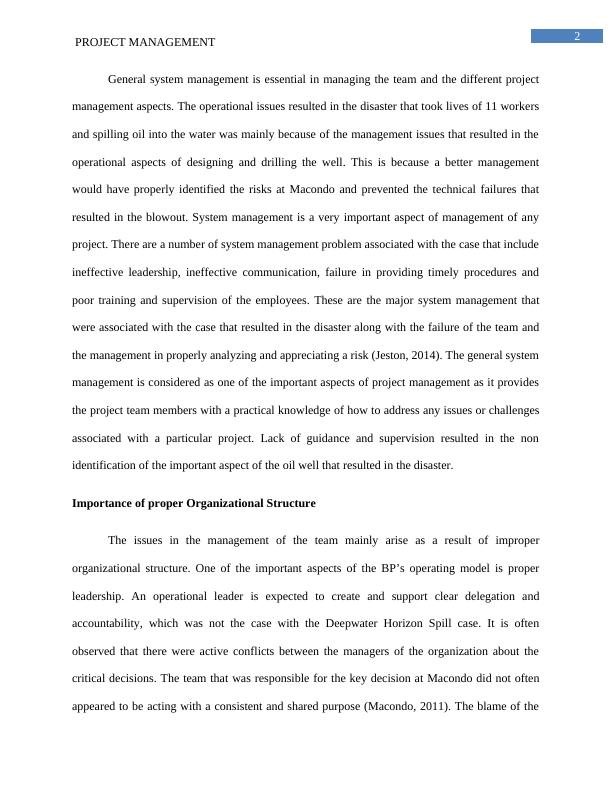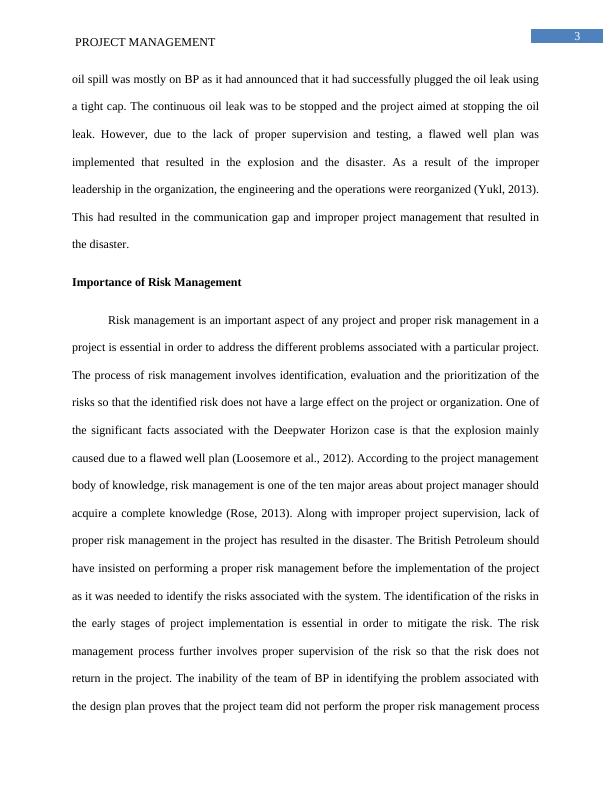Project Management: Lessons from the Gulf Oil Disaster
Added on 2023-06-11
11 Pages2836 Words273 Views
Running head: PROJECT MANAGEMENT
Project Management
Name of the Student
Name of the University
Author Note
Project Management
Name of the Student
Name of the University
Author Note

1
PROJECT MANAGEMENT
Introduction
The essay takes into consideration the project management issues that resulted in the Gulf
Oil disaster that considerably affected the future of offshore drilling. There are different aspects
of project management that is needed to be considered in every project. The essay will evaluate
the importance of some of the basic project management principles, which includes general
system management, efficiency in the organizational structure forms and culture, risk
management in the project, alignment with the portfolio, business value, portfolio management
and organizational maturity (Teller Kock & Gemünden, 2014). The Deepwater horizon oil spill
is an engineering disaster that began in April 2010. The deepwater horizon rig is owned and
operated by the offshore oil drilling company Transocean. The disaster took the life of 11
workers. The disaster was mainly caused in due to the lack of supervision of the offshore
drilling. Although the organization had involved advanced technologies in their project, the
disaster occurred simply due to lack of proper supervision and appropriate risk management
which was necessary in this case (Kerzner & Kerzner, 2017). The disaster was unforeseen as
everyone involved with the project was quite satisfied. The disaster or the explosions were
mainly caused due to a flawed well plan as the well plan did not include enough cement between
the production casing and the protection casing which was necessary (DEEP WATER Report to
National commission, 2018). This therefore proves to be a case of improper project management,
improper supervision and testing of the project works. The Macondo disaster proves to be a case
of failure of the management as the management breakdown has affected a number of
operational aspects of designing and drilling a well. The different project management aspects
that went wrong with this case are discussed in the following paragraphs.
Issues with General System Management
PROJECT MANAGEMENT
Introduction
The essay takes into consideration the project management issues that resulted in the Gulf
Oil disaster that considerably affected the future of offshore drilling. There are different aspects
of project management that is needed to be considered in every project. The essay will evaluate
the importance of some of the basic project management principles, which includes general
system management, efficiency in the organizational structure forms and culture, risk
management in the project, alignment with the portfolio, business value, portfolio management
and organizational maturity (Teller Kock & Gemünden, 2014). The Deepwater horizon oil spill
is an engineering disaster that began in April 2010. The deepwater horizon rig is owned and
operated by the offshore oil drilling company Transocean. The disaster took the life of 11
workers. The disaster was mainly caused in due to the lack of supervision of the offshore
drilling. Although the organization had involved advanced technologies in their project, the
disaster occurred simply due to lack of proper supervision and appropriate risk management
which was necessary in this case (Kerzner & Kerzner, 2017). The disaster was unforeseen as
everyone involved with the project was quite satisfied. The disaster or the explosions were
mainly caused due to a flawed well plan as the well plan did not include enough cement between
the production casing and the protection casing which was necessary (DEEP WATER Report to
National commission, 2018). This therefore proves to be a case of improper project management,
improper supervision and testing of the project works. The Macondo disaster proves to be a case
of failure of the management as the management breakdown has affected a number of
operational aspects of designing and drilling a well. The different project management aspects
that went wrong with this case are discussed in the following paragraphs.
Issues with General System Management

2
PROJECT MANAGEMENT
General system management is essential in managing the team and the different project
management aspects. The operational issues resulted in the disaster that took lives of 11 workers
and spilling oil into the water was mainly because of the management issues that resulted in the
operational aspects of designing and drilling the well. This is because a better management
would have properly identified the risks at Macondo and prevented the technical failures that
resulted in the blowout. System management is a very important aspect of management of any
project. There are a number of system management problem associated with the case that include
ineffective leadership, ineffective communication, failure in providing timely procedures and
poor training and supervision of the employees. These are the major system management that
were associated with the case that resulted in the disaster along with the failure of the team and
the management in properly analyzing and appreciating a risk (Jeston, 2014). The general system
management is considered as one of the important aspects of project management as it provides
the project team members with a practical knowledge of how to address any issues or challenges
associated with a particular project. Lack of guidance and supervision resulted in the non
identification of the important aspect of the oil well that resulted in the disaster.
Importance of proper Organizational Structure
The issues in the management of the team mainly arise as a result of improper
organizational structure. One of the important aspects of the BP’s operating model is proper
leadership. An operational leader is expected to create and support clear delegation and
accountability, which was not the case with the Deepwater Horizon Spill case. It is often
observed that there were active conflicts between the managers of the organization about the
critical decisions. The team that was responsible for the key decision at Macondo did not often
appeared to be acting with a consistent and shared purpose (Macondo, 2011). The blame of the
PROJECT MANAGEMENT
General system management is essential in managing the team and the different project
management aspects. The operational issues resulted in the disaster that took lives of 11 workers
and spilling oil into the water was mainly because of the management issues that resulted in the
operational aspects of designing and drilling the well. This is because a better management
would have properly identified the risks at Macondo and prevented the technical failures that
resulted in the blowout. System management is a very important aspect of management of any
project. There are a number of system management problem associated with the case that include
ineffective leadership, ineffective communication, failure in providing timely procedures and
poor training and supervision of the employees. These are the major system management that
were associated with the case that resulted in the disaster along with the failure of the team and
the management in properly analyzing and appreciating a risk (Jeston, 2014). The general system
management is considered as one of the important aspects of project management as it provides
the project team members with a practical knowledge of how to address any issues or challenges
associated with a particular project. Lack of guidance and supervision resulted in the non
identification of the important aspect of the oil well that resulted in the disaster.
Importance of proper Organizational Structure
The issues in the management of the team mainly arise as a result of improper
organizational structure. One of the important aspects of the BP’s operating model is proper
leadership. An operational leader is expected to create and support clear delegation and
accountability, which was not the case with the Deepwater Horizon Spill case. It is often
observed that there were active conflicts between the managers of the organization about the
critical decisions. The team that was responsible for the key decision at Macondo did not often
appeared to be acting with a consistent and shared purpose (Macondo, 2011). The blame of the

3
PROJECT MANAGEMENT
oil spill was mostly on BP as it had announced that it had successfully plugged the oil leak using
a tight cap. The continuous oil leak was to be stopped and the project aimed at stopping the oil
leak. However, due to the lack of proper supervision and testing, a flawed well plan was
implemented that resulted in the explosion and the disaster. As a result of the improper
leadership in the organization, the engineering and the operations were reorganized (Yukl, 2013).
This had resulted in the communication gap and improper project management that resulted in
the disaster.
Importance of Risk Management
Risk management is an important aspect of any project and proper risk management in a
project is essential in order to address the different problems associated with a particular project.
The process of risk management involves identification, evaluation and the prioritization of the
risks so that the identified risk does not have a large effect on the project or organization. One of
the significant facts associated with the Deepwater Horizon case is that the explosion mainly
caused due to a flawed well plan (Loosemore et al., 2012). According to the project management
body of knowledge, risk management is one of the ten major areas about project manager should
acquire a complete knowledge (Rose, 2013). Along with improper project supervision, lack of
proper risk management in the project has resulted in the disaster. The British Petroleum should
have insisted on performing a proper risk management before the implementation of the project
as it was needed to identify the risks associated with the system. The identification of the risks in
the early stages of project implementation is essential in order to mitigate the risk. The risk
management process further involves proper supervision of the risk so that the risk does not
return in the project. The inability of the team of BP in identifying the problem associated with
the design plan proves that the project team did not perform the proper risk management process
PROJECT MANAGEMENT
oil spill was mostly on BP as it had announced that it had successfully plugged the oil leak using
a tight cap. The continuous oil leak was to be stopped and the project aimed at stopping the oil
leak. However, due to the lack of proper supervision and testing, a flawed well plan was
implemented that resulted in the explosion and the disaster. As a result of the improper
leadership in the organization, the engineering and the operations were reorganized (Yukl, 2013).
This had resulted in the communication gap and improper project management that resulted in
the disaster.
Importance of Risk Management
Risk management is an important aspect of any project and proper risk management in a
project is essential in order to address the different problems associated with a particular project.
The process of risk management involves identification, evaluation and the prioritization of the
risks so that the identified risk does not have a large effect on the project or organization. One of
the significant facts associated with the Deepwater Horizon case is that the explosion mainly
caused due to a flawed well plan (Loosemore et al., 2012). According to the project management
body of knowledge, risk management is one of the ten major areas about project manager should
acquire a complete knowledge (Rose, 2013). Along with improper project supervision, lack of
proper risk management in the project has resulted in the disaster. The British Petroleum should
have insisted on performing a proper risk management before the implementation of the project
as it was needed to identify the risks associated with the system. The identification of the risks in
the early stages of project implementation is essential in order to mitigate the risk. The risk
management process further involves proper supervision of the risk so that the risk does not
return in the project. The inability of the team of BP in identifying the problem associated with
the design plan proves that the project team did not perform the proper risk management process

End of preview
Want to access all the pages? Upload your documents or become a member.
Related Documents
Deepwater Horizon Oil Spill and Offshore Drilling: Lessons for Future Operations Managerslg...
|11
|2816
|459
BP Deepwater Horizon Oil Spill and Offshore Drillinglg...
|12
|3201
|104
RISK MANAGEMENT: DEEP WATER HORIZON OIL SPILL.lg...
|10
|2390
|4
Marine and Air Pollution - Caselg...
|7
|1243
|15
Project Complexity: Macondo Well Blowout Scenariolg...
|7
|1580
|354
Deepwater Horizon Project Study: Risk Management and Organizational Maturitylg...
|8
|2611
|405
